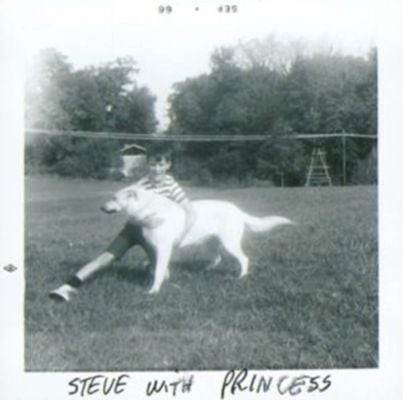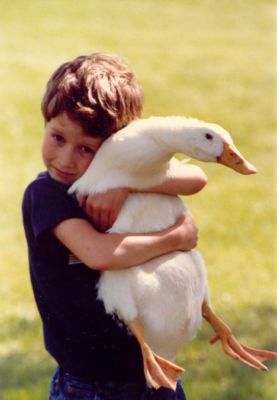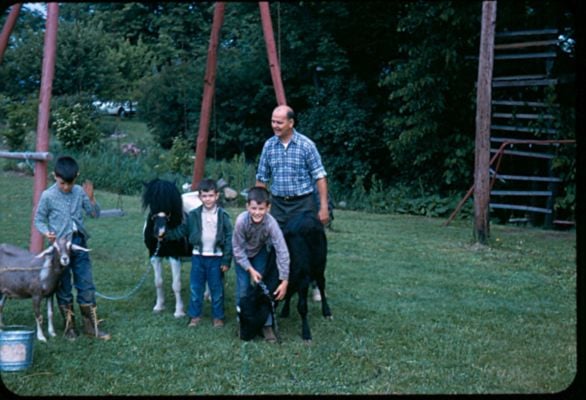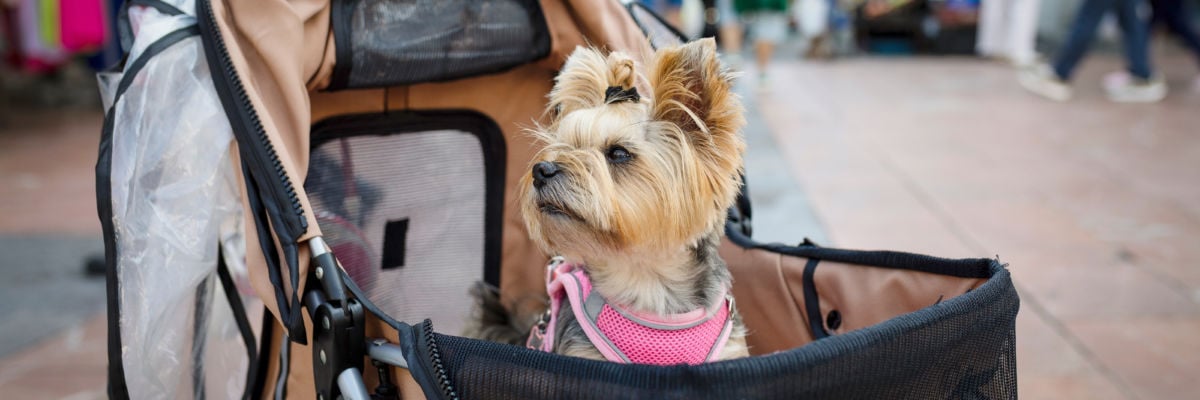
Let me start by saying I have nothing against pets—dogs, cats, or any other type. I was raised on a small farm with a variety of animals. My morning routine included shoveling the manure left by my pony, Betty Lou, and Mama Goat (whom I milked twice a day) and our other four-legged friends. I collected the chicken and duck eggs and fed the rabbits. I loved every minute of it.
My dog Princess was my constant companion as I ran through the woods as a boy and played baseball in our front yard. If you saw me, you saw Princess, too. After marriage, we had lots of animals for our kids and grandkids. Pets are beneficial for children’s development and helpful and comforting for many people. They are great in their proper place.

 Me with my dog Princess in September 1966; my son with Wilbur the Duck in 1990.
Me with my dog Princess in September 1966; my son with Wilbur the Duck in 1990.
Families have always enjoyed pets. But over recent decades, things have shifted. Today, there is an alarming tendency to see pets as family members, even as substitute children.
My grandkids are very Catholic, and they are also very inquisitive. While home from university this summer (Ave Maria University and Wyoming Catholic), four of them suggested that we visit a local mega-church out of curiosity to see how they worship. We did—and it was sad. Perhaps someday I will describe what we experienced there, but for now, I have only one thing to share. I will start the way they started.
With thousands of “worshipers” sipping their coffee in the comfy theater-style seats, the pastor strolled onto the massive stage. As the lights turned up, we saw him with a little puppy in his arms. He proudly announced, “I would like to introduce you to my son.” (He then said the dog’s name, which I have since forgotten.) “My son has a bigger brother at home who is too large to bring to church.”
He spent almost five minutes talking about his dog, as though it were a person, a son, and a part of his family. The crowd roared their approval and applauded. My grandkids looked at me with shock. I threw my hands up in disbelief and whispered, “What in the world . . . ?”
I see people in my neighborhood walking their dogs in strollers. The birth rates are way down, and the pet industry is mushrooming. Doggie strollers are now a “thing.” South Korea is one country setting the trend. Dog strollers are no longer a novelty—they now sell more dog strollers than they do baby strollers. Dog carriages now come in a wide array of designer styles. Newsweek recently noted,
South Korea, which has one of the world’s lowest fertility rates, recorded another drop in 2023, with the average number of expected babies per woman going to 0.72 from 0.78 in 2022. . . . Yoon Hyun-shin, CEO of Pet Friends, South Korea’s largest online pet-shopping platform, told the Journal that pet ownership has become a major trend.
The surge in pet stroller purchases is striking. Sales have quadrupled since 2019, and top-end models can sell for as much as $1,100. . . . “Pet ownership is rising, and so is spending on pets as people choose them over children,” Yoon said.
“What I worry about is young people not loving each other,” South Korea’s labor minister, Kim Moon-soo, said in 2023. “Instead, they love their dogs and carry them around. They don’t get married, and they don’t have children.”
Trends in the United States are also on the rise—not only for dogs, but also for cats. Fewer children, an aging population, and the growing popularity of dogs on TV and in advertising are partially driving these trends. The pet industry is booming. The Washington Post ran an opinion piece entitled, “A snake bit my cat. Clearing out my bank accounts to save him was an easy choice.” It went on to explain how this woman spent $6,200 on vet services.
At a nice restaurant recently, we unhappily sat in close quarters with two girls eating lunch with their “fur babies” on their laps. Those dogs were cooed and fondled as though they were substitute babies. Others had dogs at their feet tripping the waiters. More than once, I’ve had a dog or cat squirming at my feet on an airplane.
Is this something new? In our modern world, yes. This did not exist in my parents’ generation. In many parts of the world, dogs are frowned upon as unclean animals. However, in other places, they have been coddled in the same manner as they are today. The phenomenon of embracing animals as family, or as more than just animals, is not unknown in history.
I recently came across a fascinating quote from Plutarch (ca. A.D. 50-120), a Roman citizen, pagan writer, priest of Apollo, Greek biographer, essayist, and Platonist. He lived during biblical times but was obviously not a Christian.
Caesar [Augustus] once, seeing some wealthy strangers at Rome, carrying up and down with them in their arms and bosoms young puppy-dogs and monkeys, embracing and making much of them, took occasion not unnaturally to ask whether the women in their country were not used to bear children; by that prince-like reprimand gravely reflecting upon persons who spend and lavish upon brute beasts that affection and kindness which nature has implanted in us to be bestowed on those of our own kind [that is, real human sons and daughters].
With like reason may we blame those who misuse that love of inquiry and observation which nature has implanted in our souls, by expending it on objects unworthy of the attention either of their eyes or their ears, while they disregard such as are excellent in themselves, and would do them good.
Isn’t it interesting that Plutarch quotes the surprise and dismay of the Caesar of Rome, who delivered a “prince-like reprimand” to those women who “lavish upon brute beasts that affection and kindness which nature has implanted in us to be bestowed on those of our own kind”—namely, human beings?
Does the Catholic Church speak about pets? The Catechism does! It says,
They may be domesticated to help man in his work and leisure. . . . It is contrary to human dignity to cause animals to suffer or die needlessly. It is likewise unworthy to spend money on them that should as a priority go to the relief of human misery. One can love animals; one should not direct to them the affection due only to persons (2417-18).
Animals were created by God and intended to be used at for work and leisure. Pets are great. They comfort many a lonely person, entertain children, assist the blind or the handicapped, and perform a dozen other good and helpful services.
It is disturbing, though, when a society begins to abandon marriage and bearing children and resorts to pets as substitutes. It should raise our eyebrows when people spend an inordinate amount of time and money on pets that could help the poor or needy. Some of the alarming statistics are presented in the Catholic World Report article “Have No Dogs Before Me.”
Pets play a valuable role in our lives, but misplaced affection can also be a concern. As Christians and as a society, we should strike the proper balance.

Picture of me with our animals. I am holding the cow right in front of my dad.



